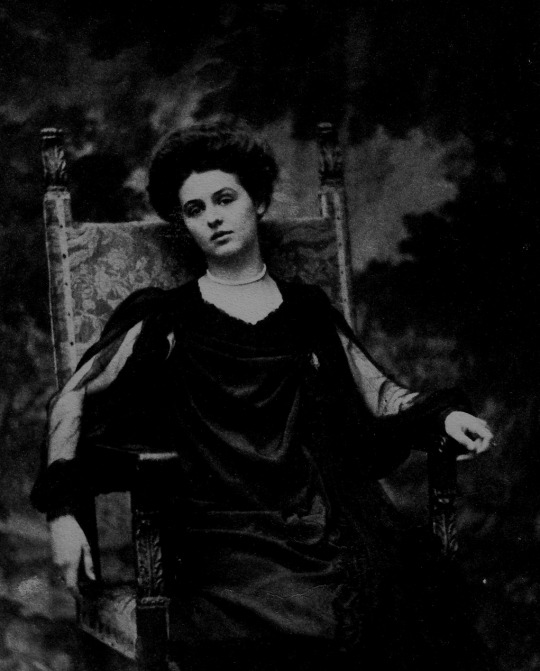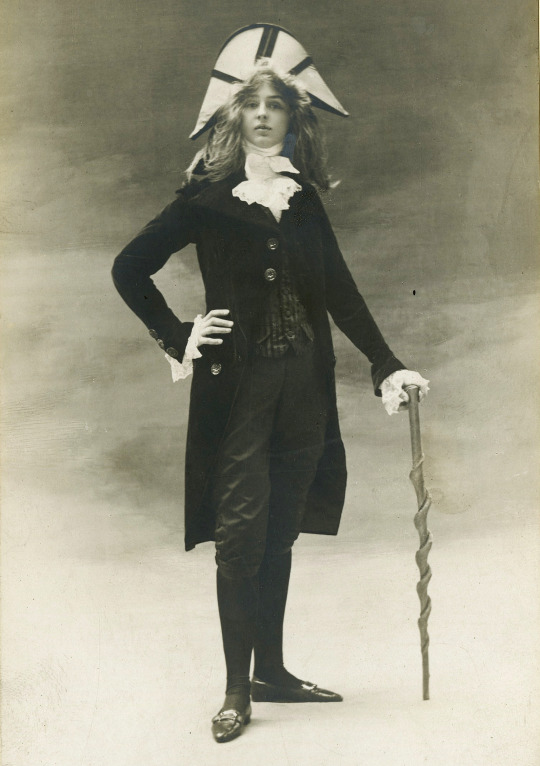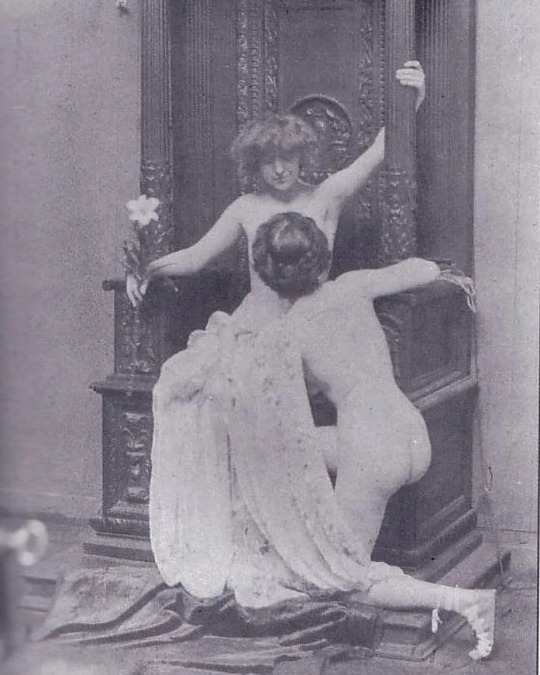#Pauline Tarn
Explore tagged Tumblr posts
Text
« Et pourtant, au fond de ma tristesse, je suis heureuse. Tu m'as réconciliée avec tant de choses ! Et, parce que tu l'aimes aujourd'hui, j'aime mon corps ainsi qu'un jardin où tu te serais plue à errer. »
–Renée Vivien dans une lettre à Natalie Clifford Barney, Hôtel des Pays-Bas, Utrecht, circa 1904, citée dans Le papillon de l'âme de Marc Bonvalot
#Renée Vivien#Pauline Tarn#Natalie Clifford Barney#Natalie Barney#Correspondance#histoire lesbienne#lesbian history#NCBRV#Marc Bonvalot#Le papillon de l'âme
7 notes
·
View notes
Text

Renée Vivien, from Faste des tissus (in La Vénus des aveugles, Alphonse Lemerre 1904)

Renée Vivien (born Pauline Mary Tarn, 11th June 1877 – 18th November 1909) was a British poet who wrote in French, in the style of the Symbolistes and Parnassiens.
56 notes
·
View notes
Text
Renée Vivien

Renée Vivien (born Pauline Mary Tarn; 11 June 1877 – 18 November 1909), was a British poet who wrote in French, in the style of the Symbolistes and the Parnassiens. A high-profile lesbian in the Paris of the Belle Époque, she was as notable for her lifestyle as for her work, which has received more attention following a recent revival of interest in Sapphic verse. Many of her poems are autobiographical, reflecting a life of extreme hedonism, leading to early death. She was the subject of a pen-portrait by her friend Colette.
4 notes
·
View notes
Text

Malcolm McDowell in A Clockwork Orange (Stanley Kubrick, 1971)
Cast: Malcolm McDowell, Warren Clarke, James Marcus, Michael Tarn, Patrick Magee, Adrienne Corri, Aubrey Morris, Miriam Karlin, Anthony Sharp. Screenplay: Stanley Kubrick, based on a novel by Anthony Burgess. Cinematography: John Alcott. Production design: John Barry. Costume design: Milena Canonero. Film editing: Bill Butler.
A Clockwork Orange was panned by Pauline Kael, Andrew Sarris, and Roger Ebert, but it remains one of Stanley Kubrick's most popular films, with an 8.3 rating on IMDb. It's a tribute to Kubrick that the movie can elicit such widely divergent responses. I can see what Kael, Sarris, and Ebert are complaining about while at the same time admitting that the film is undeniably entertaining in a "horrorshow" way: that being both novelist Anthony Burgess's Nadsat coinage from the Russian word "khorosho," meaning "good," and the English literal sense. For it is a kind of horror movie, with Alex as the monster spawned by modern society -- implacable, controlled only by the most drastic and abhorrent means, in this case a kind of behavioral conditioning. The aversion therapy to which Alex is subjected reminds me of the attempts to convert gay people to heterosexuality. Which is not to say that Kubrick's film isn't exploitative in the extreme, relying on images of violence and sexuality that almost justify Kael's suggestion that Kubrick is a kind of failed pornographer. It is not the kind of movie that should go without what today are called "trigger warnings." What's good about A Clockwork Orange is certainly Malcolm McDowell's performance as Alex, one of the few really complex human beings in Kubrick's caricature-infested films. Some of his most memorable scenes in the movie were partly improvised, as when he sings "Singin' in the Rain" during his attack on the Alexanders, and when he opens his mouth like a bird when the minister of the interior is feeding him. Kubrick received three Oscar nominations, as producer, director, and screenwriter, and film editor Bill Butler was also nominated, but the movie won none, losing in all four categories to The French Connection (William Friedkin, 1971). It deserved nominations not only for McDowell, but also for John Alcott's cinematography and John Barry's production design.
4 notes
·
View notes
Text
TWD/Zombie AU Character List
I am just keeping a running list of characters and their names I have vague ideas for. I'll add more as I go on. Feel free to ask about them if you want, I am enjoying planning them.
PAULINE ROWLE | PROWL
REAGAN CARLEE GALL "R.C.; ARCEE" | ARCEE
IGNATIUS SENTINEL | SENTINEL PRIME
MESOTHULAS TARA THOLE | TARANTULAS
KATHERINE ULYSSES PETERSON | KUP
OSTAROS ROWLE-THOLE | SPRINGER
ORION PAX | OPTIMUS PRIME
RODERICK PAX "RODDY; RODDERS; ROD" | HOT ROD
JAZZ ROCHE | JAZZ
SONYA “SUNNY” | SUNSTREAKER
SADIE “SIDES" | SIDESWIPE
FARAH AUDET | PHARMA
DAMUS PAX | TARN
SHAKTI SHARMA | SHOCKWAVE
RÁICHÉAL DONOGHUE "RATCHET" | RATCHET
HAYAE SAWADA, SAWADA HAYAE (沢田迅依) “DRIFT” | DRIFT
KARIN KAZEKAMI, KAZEKAMI KARIN (風上郁鈴) “KAREN, RIN” | WINDBLADE
MEGAN EVERETT | MEGATRON
1 note
·
View note
Text

#renee vivien#renée vivien#historical sapphists#lesbian literature#literature#a woman appeared to me#idylesaphique#pauline tarn
27 notes
·
View notes
Text
“‘... for dying young is not a natural end. There is such a revolt of all the flesh that that revolt must be prolonged into the final world. One must not sleep in peace within the tomb when one dies young.’”
- Renée Vivien (exerpt from the short story “The Sin Against the Roses” from Faustina and Other Stories, translated by Brian Stableford)
#pauline tarn#renee vivien#short stories#women writers#lesbian#historical lesbians#literature#the most precious#belle epoque#my post#quotation
19 notes
·
View notes
Quote
Figurez-vous que j'ai une idée que ma cervelle est faite en verre et qu'elle va se briser quelquefois avec ce petit fracas particulier que j'aime à entendre quand je m'amuse à briser le cristal fragile !... A présent j'entends distinctement quelque chose qui se brise dans ma tête.
Lettre de Pauline Tarn (Renée Vivien) à Amédée Moullé
28 notes
·
View notes
Photo

Ce furent d'irréelles fiançailles, délicates à l'égal des roses blanches que Béla apportait chaque jour. Ce furent des aveux plus fervents que des poèmes, et des frissons d'âme sur les lèvres. Au profond des silences, passait le rêve nuptial. – Le Prince charmant, Renée Vivien
6 notes
·
View notes
Text
« Je me souviens du verger du Mytilène où nous retournerons un jour, et des jasmins de Smyrne, et du Parthénon dans la nuit...
Je me souviens du joueur errant de petites flûtes asiatiques et de la lune sur la mer et de l'île fantastique... de l'île du Passé, et pâle dans le crépuscule. Et de tout et de tout...
Mais surtout je me souviens de cette merveilleuse et première nuit à Mytilène, la nuit où nous nous sommes rejointes et retrouvées.
Ah ! ne me brise pas une seconde fois ! Ne me rejette plus aux hasards... Veux-tu ? »
–Renée Vivien dans une lettre à Natalie Clifford Barney, Hôtel des Pays-Bas, Utrecht, circa 1904, citée dans Le papillon de l'âme de Marc Bonvalot
#Renée Vivien#Pauline Tarn#Natalie Clifford Barney#Natalie Barney#Correspondance#Le papillon de l'âme#Marc Bonvalot#NCBRV#mytilène#histoire lesbienne#lesbian history
3 notes
·
View notes
Text

Renée Vivien, from A la femme aimée (in La Vénus des aveugles, Alphonse Lemerre 1904)

Renée Vivien (born Pauline Mary Tarn, 11th June 1877 – 18th November 1909) was a British poet who wrote in French, in the style of the Symbolistes and Parnassiens.
15 notes
·
View notes
Photo

Ellen Goin, Renée Vivien, and Laura Clifford Barney
c. 1900
Alice Pike Barney Papers, Smithsonian Institution Archives
5 notes
·
View notes
Photo

https://en.wikipedia.org/wiki/Ren%C3%A9e_Vivien
11 notes
·
View notes
Photo

Pauline Desramont, Tarn, scène d'enfance au bord de la rivière, tirage à émulsion liquide sur papier lin et coton, 26,5 x 38cm, 2018
prodromus-galerie
1 note
·
View note
Text
[Renée Vivien. La Saffo della Belle Époque][Teresa Campi]
Teresa Campi, la prima studiosa italiana di Renée Vivien, restituisce finalmente un ritratto sincero di questa straordinaria donna presentandola non più come una figura misteriosa e “depravata” ma anzi come un personaggio appassionato
Nella Parigi di inizio Novecento, venticinque secoli dopo Saffo, in una città mondana e libertina, tra i pizzi delle gonne al Moulin Rouge e i cocktail “al vetriolo” serviti nei salotti, una poetessa sfidò il suo tempo, scrivendo versi appassionati sull’amore e sulle donne. Il suo nome era Pauline Mary Tarn (1877-1909), meglio conosciuta come Renée Vivien, una “figlia di Baudelaire”, come fu…

View On WordPress
#2023#Belle Époque#critica letteraria#Italia#LGBT#LGBTQ#Natalie Clifford Barney#Odoya#Pauline Mary Tarn#Renée Vivien#Renée Vivien. La Saffo della Belle Époque#Saggi#Saggistica#Teresa Campi
1 note
·
View note
Text

Natalie Clifford Barney and her lover/long-term friend Eva Palmer during the era of their romantic relationship
Notation: Eva and Natalie became aquatinted whilst vacationing in Bar Harbor, Maine. They formed a relationship in 1893 and maintained it long enough to move to Paris together, becoming an influential couple in the Parisian sapphic community. Their relationship, while Natalie’s first truly serious pursuit was also fluid. Natalie helped Eva pursue other women such as Pauline Tarn. However, their relationship eventually came to a close and Eva married the Greek poet Angelos Sikelianos.
85 notes
·
View notes